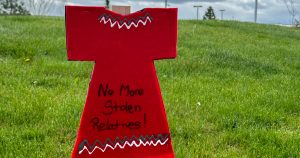Mission, OR – Wildlife biologists from the Confederated Tribes of the Umatilla Indian
Reservation (CTUIR) Department of Natural Resources received the results this week of
biological tests on a four and a half year old bighorn sheep ram harvested from the Burnt River
Herd in Oregon. The test results indicate the ram was carrying the deadly bacterial disease
Mycoplasma ovipneumoniae that has been responsible for the loss of bighorn populations
throughout the western United States. The respiratory pathogen of domestic sheep and goats,
while generally not harmful to domestics, causes lethal pneumonia in wild bighorn sheep and
mountain goats. The bacteria is not harmful to humans and the meat of infected but otherwise
healthy-looking animals is safe to consume. However, animals with obvious symptoms of
serious disease should not be consumed.
Treaty harvest of bighorn sheep is tightly regulated by the CTUIR Fish and Wildlife Commission
and closely coordinated with Oregon Department of Fish and Wildlife. Mandatory harvest
reporting and biological sampling are conducted by the CTUIR to help assure individual and
herd health of this recovering species. “If this results in an outbreak, it could put our recovery
efforts back 20 years” said Dr. Scott Peckham, CTUIR Big Game Ecologist, “and could eliminate
up to half of the tribal harvest opportunity for the foreseeable future. We will continue to monitor
the situation closely and coordinate with the Oregon Department of Fish and Wildlife.”
This is the first positive test for a tribally harvested bighorn and the second bighorn herd in
northeast Oregon to test positive for Mycoplasma ovipneumoniae this year. It is not known
where the bighorn was exposed to the pathogens, but there are numerous commercial and farm
flocks of domestic sheep and goats in the immediate area. Maintaining safe, physical separation
between domestic sheep and goats and wild, free ranging bighorn sheep is an ongoing
management challenge that limits the abundance and availability of bighorn sheep and their
harvest.
The Confederated Tribes of the Umatilla Indian Reservation is made up of the Cayuse, Umatilla,
and Walla Walla Tribes, formed under the Treaty of 1855 at the Walla Walla Valley, 12 Stat.
945. In 1949, the Tribes adopted a constitutional form of government to protect, preserve and
enhance the treaty rights guaranteed under federal statute.



